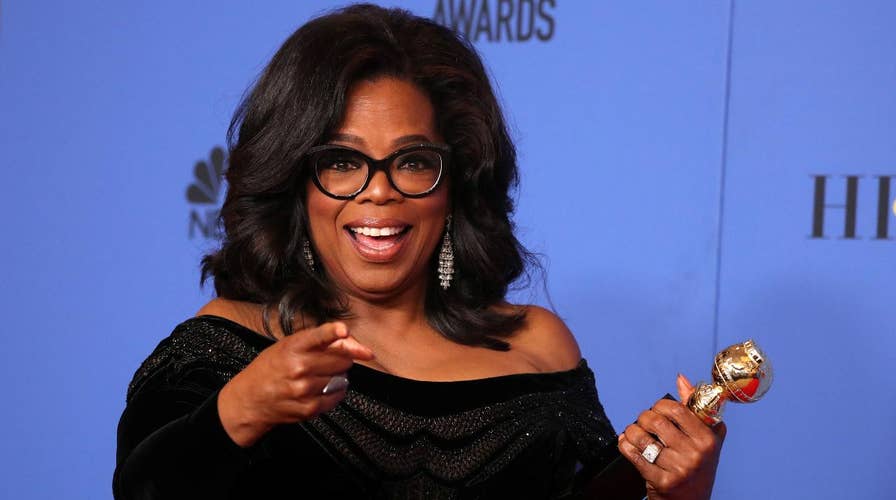'Oprah 2020': NBC and celebs dub Oprah Winfrey 'our future president'
Could Oprah Winfrey be our next president in 2020? See how NBC network and celebrities dubbed Oprah “our future president” following her speech at the Golden Globe awards.
I know Oprah Winfrey. So I can say it: President Trump, sir, you are no Oprah.
Trump said last week he’d beat Winfrey in the 2020 presidential race. And he dismissed the burst of talk about her possible 2020 candidacy with a belittling comment: “Oprah will be a lot of fun.”
Of course, that opened the door for a poll. Winfrey beat Trump by 10 percentage points, 48-38, according to Rasmussen.
Even with the polling, my initial reaction to the ‘Oprah for President’ excitement was skepticism. After the disastrous first year of the Trump presidency, and his historic low standing in the polls, I thought Americans would have a new thirst for stable, experienced leadership.
American voters also have a habit of picking a president who is the opposite of the incumbent. So why trust another TV celebrity as commander-in-chief?
But all the polling indicates that people still want an outsider — someone to shake up Washington. They remain fed up with the polarized, do-nothing Congress, the chaos in the White House and the partisan media. That means policy background and political experience are not necessary.
By that logic, our presidential elections will necessarily shift to contests among high-profile political outsiders focused on character, intelligence and integrity.
If that is the new norm for presidential politics, then Oprah is the greatest threat to Trump’s reelection other than the president himself.
Meanwhile, he continues to demonstrate that he is a threat to implode.
Oprah’s path to the presidency and the Democrats' path back to the White House are the same — they both need white women.
Last week began with the nation debating his mental fitness to be president. It ended with debate on whether “the stable genius,” as he called himself, is a racist. That sad conversation started after he stated his preference for immigrants from Norway over those from “s---hole” countries in Africa, the Caribbean and Central America.
While Trump continues to damage himself with everyone except those voters who would turn a blind eye even if he shot a man on Fifth Avenue — here, I’m using Trump’s own description of his core base — Oprah starts with equally passionate support from women voters.
In the Rasmussen poll, she beat Trump among women by 52 percent to 34 percent.
Oprah’s popularity among white women, particularly in suburban and rural America, makes her uniquely well positioned to succeed where Hillary Clinton failed as a presidential candidate.
Let’s remember that in 2016, white women made up 37 percent of the electorate. They voted for Trump over Clinton, 52 percent to 43 percent.
If Clinton had won — or even narrowed her margin of loss — with white women, she would be president today instead of Trump.
“For decades, Oprah has cultivated an extraordinarily intimate relationship with an audience that captures the entire Obama coalition,” David Burstein wrote in Vanity Fair last week. “That includes two key groups where Hillary wasn’t as strong as she could have been: non-college-educated white women and suburban white women.
“Put these voters together and Oprah can be competitive in every state Obama won in 2012…No other prospective 2020 candidate can make as clear a claim,” Burstein concluded.
Also factor in the tremendous turnout by minority women — specifically black women — that carried Democrats to victory in the 2017 Virginia gubernatorial race and the Senate special election in Alabama. Those are Oprah voters.
Oprah would make history as the first black woman president. Now that is the definition of a political outsider.
President Obama proved that race is no longer a barrier to the presidency. Clinton proved that gender still is a barrier, even with the backing of allies from her husband’s two terms in the White House.
In contrast to Clinton, Oprah’s central appeal has always been her bond with white women. They formed the audience base of her daytime talk show for decades. She is a trusted, confident, credible and comforting figure for women. She helped them make sense of the most controversial social and political issues of the time on that show.
I first appeared on Oprah’s show back in 1990. I was on a panel with rapper Ice-T, debating violent and sexual lyrics in music, and whether such graphic and explicit records should come with a warning label. I still remember how Oprah moderated the heated discussion, seeking to build consensus and advance the conversation towards something constructive.
I really got to know her when I wrote her first primetime television special. I worked directly with her and took her to visit my aging in-laws. For a star of her magnitude, she was always genuine, caring about others and, most of all, smart. Once they got over being starstruck, my family took to her like one of our own. The star I got to know really is a good person.
Another factor in Oprah’s favor is the ongoing failure of the Democrats to find a compelling candidate to run against Trump. Oprah’s path to the presidency and the Democrats' path back to the White House are the same — they both need white women.
“There’s an argument for choosing someone outside the circle,” said House Minority Leader Nancy Pelosi (D-Calif.).
She added: “Oprah has read books, she knows how to identify talent. So if we are going into a place where they are devaluing experience in terms of substance and legislative acumen…you may as well have someone who knows what they don’t know and would get the best possible people there.”
Go, Oprah!

